|
|
|
|
☀️Welcome to the Summer Newsletter!
|
After a hiatus of three years, last July we held the Ninth IPSI Global Conference! It was great to see old friends again and meet new ones. As we embark on this new phase of IPSI's journey, our aim is to infuse all our cherished members and esteemed partners with renewed energy, inspiring collective action towards fostering societies in harmony with nature.
|
Below are some highlights of what you will find in this seasonal edition:
|
- Highlights from IPSI-9
- Farewell message from Makiko Yanagiya, Deputy Director of the IPSI Secretariat
- AIRI's Urban-Rural Sustainability Hackathon & Regional Forum
- Case study on promoting sustainable development in the Solukhumbu region of Nepal
- And more!
Contact us to submit case studies and news about your activities.
|
|
|
|
|
|
Ninth Global Conference of the International Partnership for the Satoyama Initiative
|
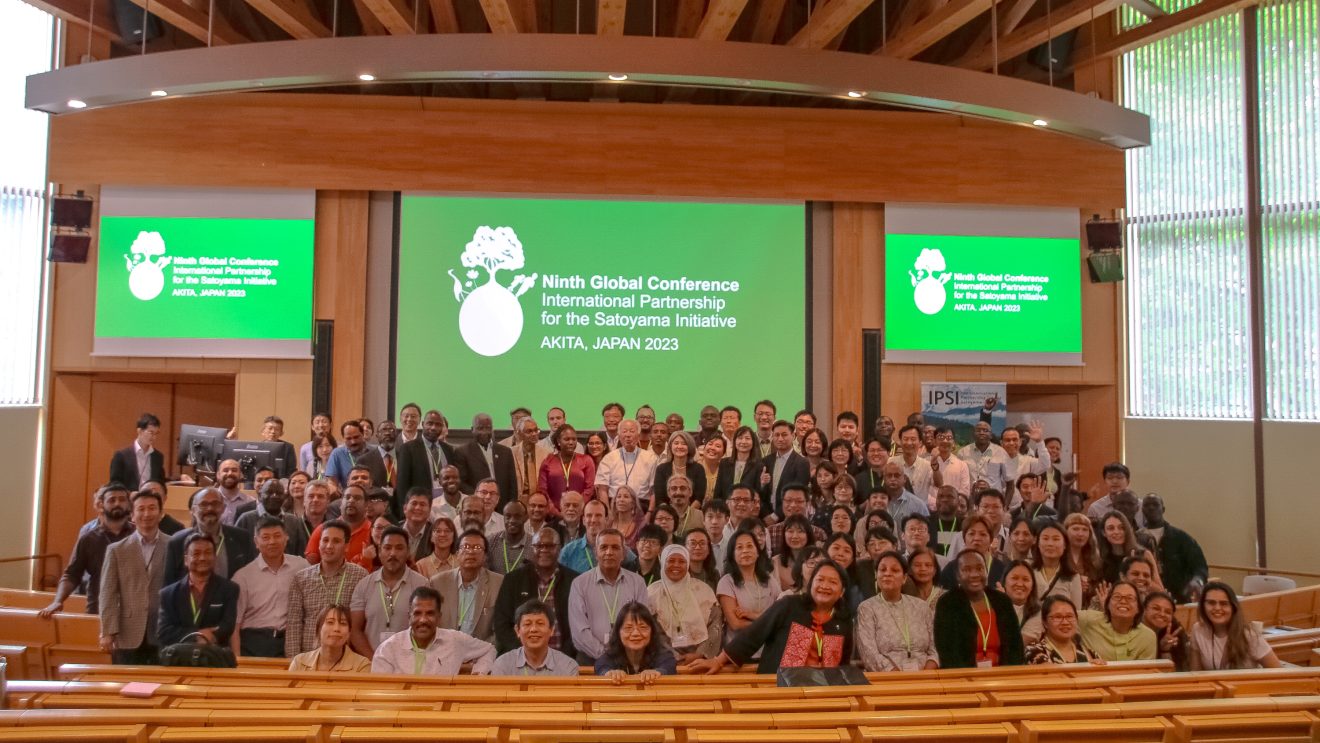
|
Photo by AIU.
|
|
We are excited to bring you the highlights of the Ninth Global Conference of the International Partnership for the Satoyama Initiative (IPSI-9), which took place from 8 to 11 July 2023 at the Akita International University in Akita, Japan. Co-organized by the United Nations University Institute for the Advanced Study of Sustainability (UNU-IAS), Akita International University (AIU), and the Ministry of the Environment, Japan, this event brought together over 180 representatives from IPSI member organisations from across the globe to discuss and strategize the path forward for IPSI.
|
|
General Assembly: A New Plan of Action
|
|
|
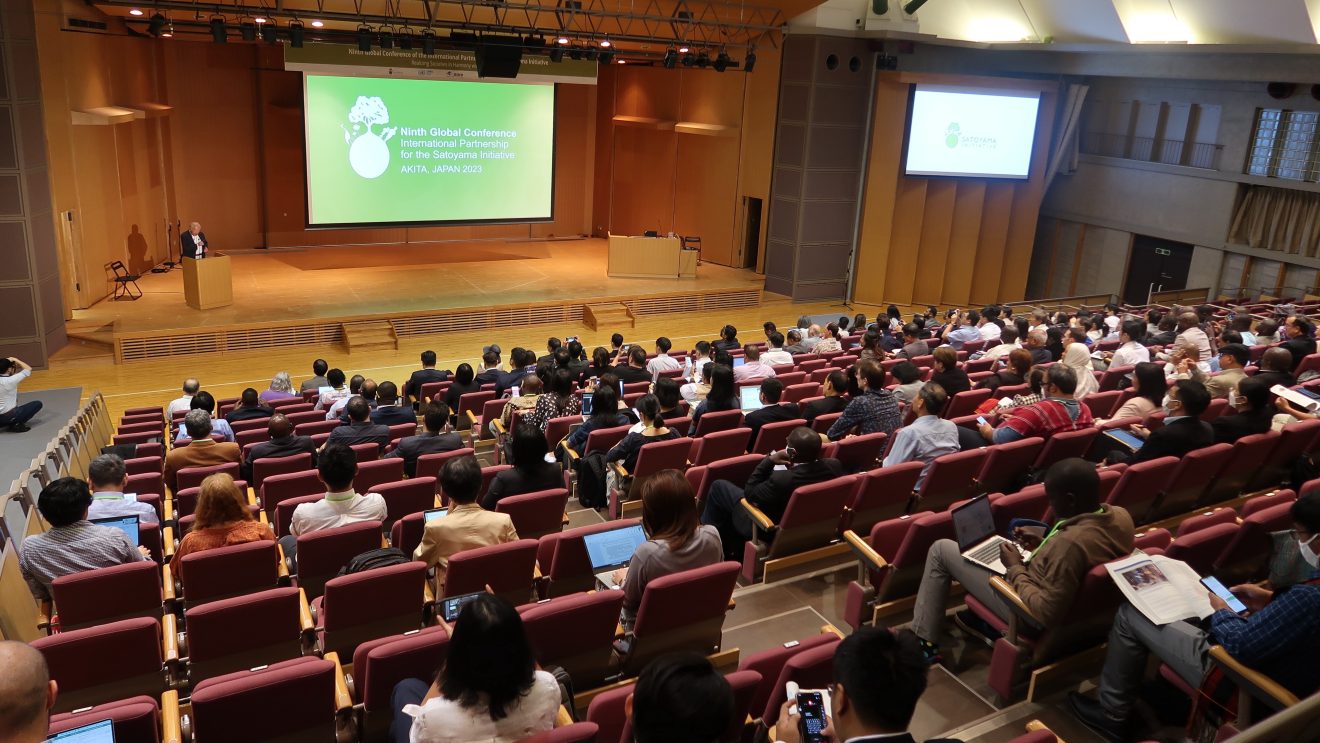
|
Photo by UNU-IAS.
|
At the General Assembly, discussions centred around the operations and strategic planning of IPSI, featuring comprehensive reports from the IPSI Steering Committee, the Sub-Committee for the revision of the Strategy and Plan of Action, and the IPSI Secretariat. One of the major outcomes was the endorsement of the new 'Strategy and Plan of Action 2023-2030 of the International Partnership for the Satoyama Initiative.' This historical strategy outlines five key objectives to guide members in contributing to activities related to the Satoyama Initiative and supporting the Kunming-Montreal Global Biodiversity Framework (GBF) in the partnership's second decade:
|
- Knowledge Co-Production, Management, and Uptake
- Institutional Frameworks and Capacity Development
- Area-Based Conservation Measures
- Ecosystem Restoration
- Sustainable Value Chain Development
|
IPSI-9 Public Forum: Empowering the Next Generation
|

|
Photo by UNU-IAS.
|
The theme of the IPSI-9 Public Forum was 'Reshaping Our Future: Youth Empowerment and Contribution to Living in Harmony with Nature.' Co-organized by the IPSI Secretariat, the Global Youth Biodiversity Network, and AIU, the event witnessed active participation from over 180 attendees, including both IPSI members and non-members.
|
The forum underscored the pivotal role of youth in biodiversity conservation and discussed ways to engage young people to drive local and global conservation efforts. Keynote presentations shed light on IPSI's role in the GBF and the power of youth in realizing its objectives. The ensuing panel discussions explored intergenerational knowledge transfer, barriers to youth engagement, and the potential of youth-led efforts to create socio-ecological harmony.
|
|
You can read more about the forum here.
|
|
Breakout Sessions: Delving into Strategic Objectives
|
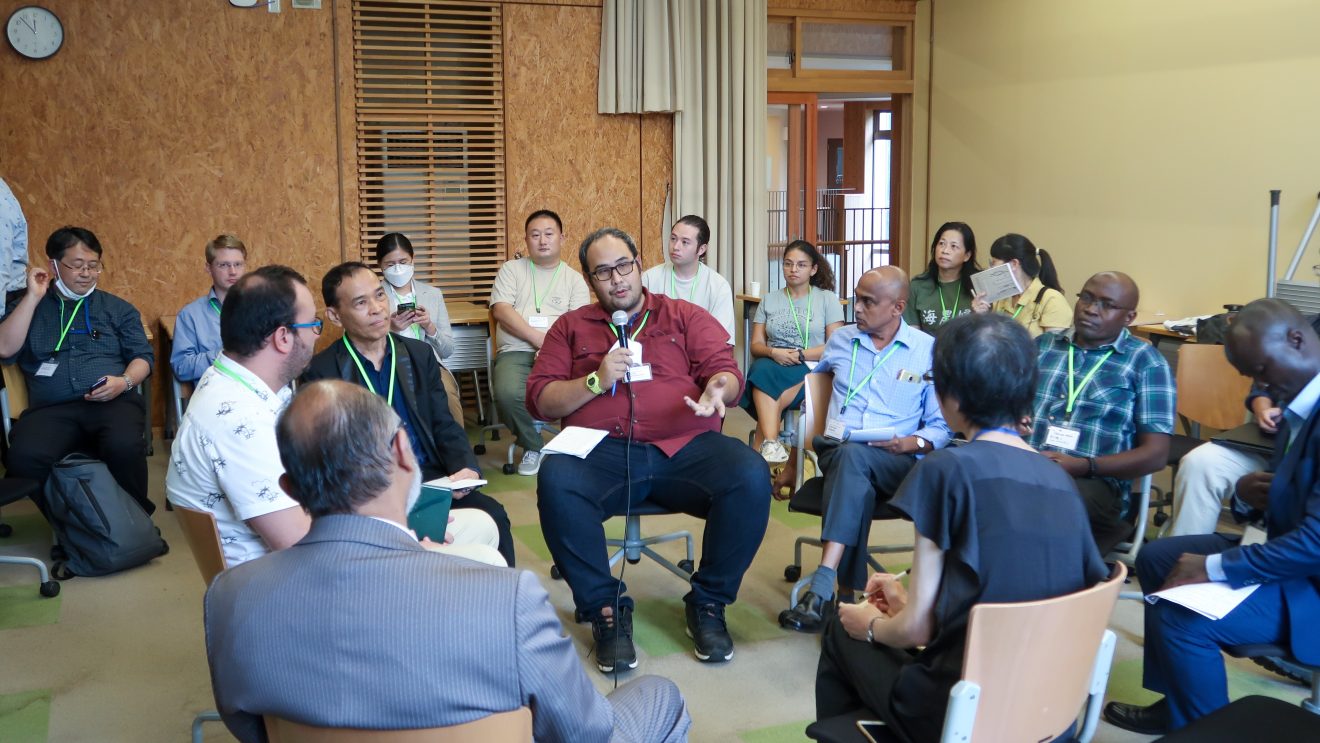
|
Photo by UNU-IAS.
|
|
On the second day of the conference, participants were divided into five groups for detailed discussions on the themes of the new strategic objectives. This format allowed for in-depth conversations on integrating knowledge systems, clarifying concepts within IPSI, raising awareness of socio-ecological production landscapes and seascapes (SEPLS) among decision-makers, and strengthening support for communities engaged in SEPLS management.
|
|
Closing Plenary: Embracing the Future
|

|
Photo by UNU-IAS.
|
The closing plenary held on July 11 marked the culmination of the conference. The outcomes of the Public Forum were reported, and recommendations for further cooperation and engagement between youth and IPSI were presented. One of the key achievements was the adoption of the 'IPSI Strategy and Plan of Action 2023-2030,' reflecting the commitment of IPSI members to advancing biodiversity conservation and sustainable landscapes and seascapes.
|
|
Read the full IPSI-9 Summary Report here.
|
Access presentations that were given during IPSI-9 here.
|
|
|
|
|
|
Work with Us!
|
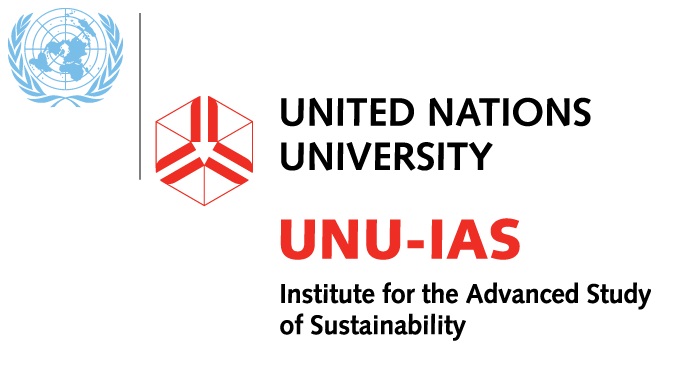
|
👩💻Would you like to be part of the IPSI Secretariat and the United Nations University for the Advanced Study of Sustainability? Take a look at the currently open job positions.
|
|
|
|
|
|
|
|
Farewell Message from IPSI Secretariat Staff: Makiko Yanagiya
|
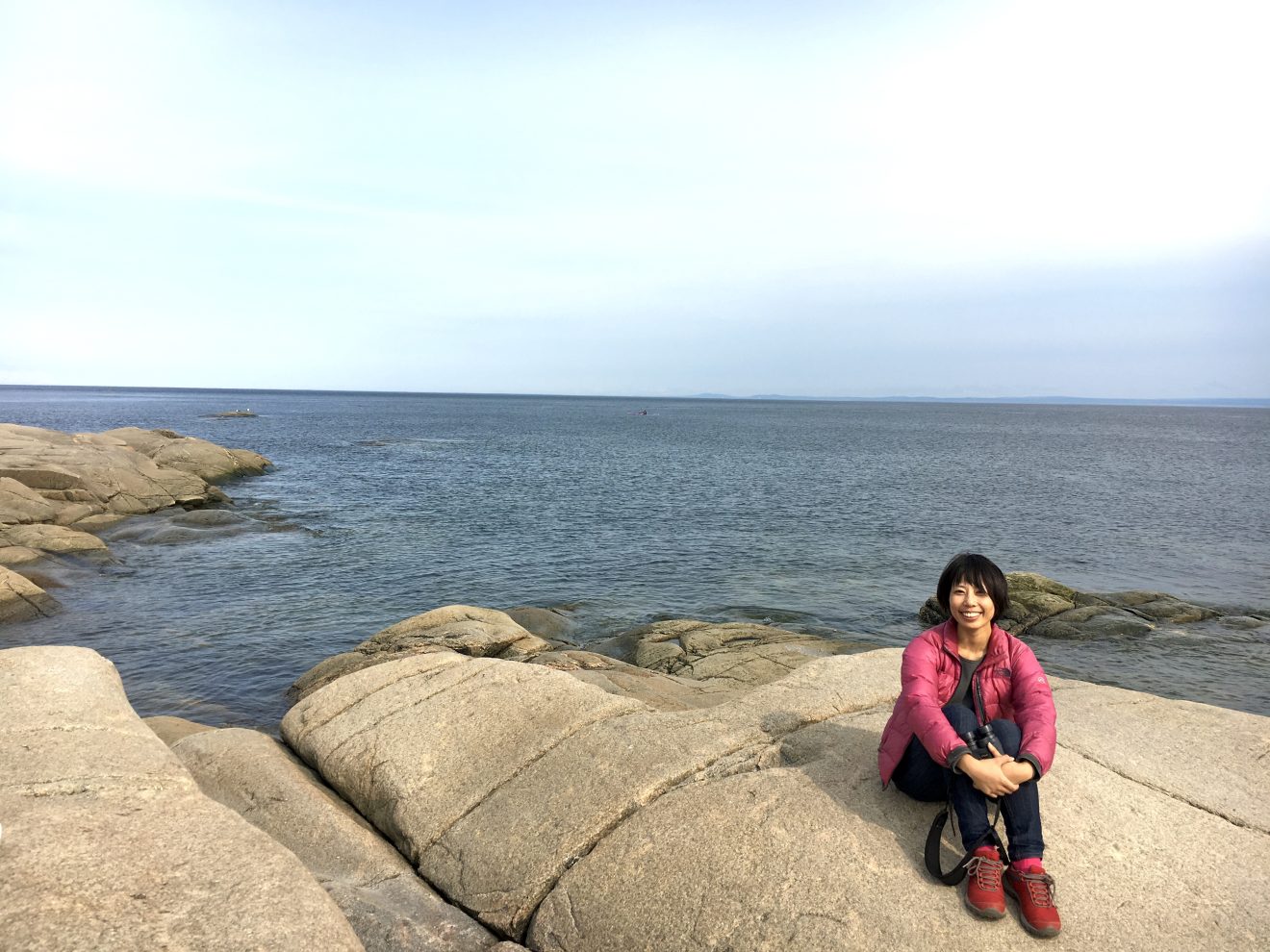
|
I imagine some of you may be surprised to see this message, but I am announcing my departure from UNU-IAS.
|
It has been a fortunate journey for me, participating in IPSI as member of the Secretariat of CBD and MOE-J, and then serving the IPSI Secretariat.
|
Growing up in a coastal area that has small-scale traditional fishery and having family history rooted in farming, the notion of landscapes and seascapes nurtured by interactions among various entities, including humans, felt innate to me. During my university years, I studied how to restore biotope in farmland ecosystem. With this experience, I expanded my research to the dynamics of traditional rice cultivation in relation to aquatic ecosystem management, studying a case of abundant rice paddies. These experiences gave me opportunities to consider how human-being can nurture biodiversity and also the significance of culture for landscape and seascape management. So, the concept of the Satoyama Initiative has held a special place in my heart. I am truly grateful for the opportunity to have encountered remarkable people working hard for the landscape and seascape management developing harmonious human-nature relationship, thanks to IPSI.
|
This experience has been enlightening and has reaffirmed my recognition on the potential for human-beings to restore ecosystems, as well as the vital role cultural elements play in biodiversity conservation and restoration, and they are related to human well-being and our shared humanity.
|
Working at the IPSI Secretariat during these challenging times marked by the pandemic, and the pivotal period for IPSI has been an extraordinary experience. Each case study presented by IPSI members is intricate, multifaceted, and also, incredibly beautiful. While there are distinctive aspects within each case study, common threads also unite them. I am firm in my belief that the Partnership holds immense value and should become even more potent in connecting our collective endeavors, fostering the resilience of our activities related to SEPLS, and disseminating the lessons we've learned at the international arena. I exerted efforts to rejuvenate the Partnership, with the aim of providing more effective support to IPSI members. Thanks to the collaboration of IPSI members and the Secretariat, I was able to contribute to the reformation of SDM and SITR modalities, as well as the formulation of the new Plan of Action endorsed at IPSI-9. Furthermore, we welcomed the Youth group to IPSI, which I considered an important step for IPSI’s development. I am hopeful that the participation of youth in SEPLS management will pave the way for the future of SEPLS and the prosperity of generations to come.
|
As I write this message, memories of numerous faces and diverse SEPLS encounters through IPSI flood my mind. I am optimistic that the new IPSI Plan of Action with five strategic objectives will serve as a wellspring of motivation for your onward journey. Embarking on the path to implementing this Plan together demands patience, but I am certain it will also be an enjoyable endeavor.
|
Starting from September 1st, I will be relocating to Okinawa, Japan, assuming the role of Director for area-based conservation measures in the Amami-Ryukyu region at MOE-Japan. After dedicating around 7 years to conceptualizing and shaping frameworks, I am thrilled to inaugurate new chapters in my life. In my upcoming capacity and undertakings, I will be committed to collaborating with people on the ground and incorporating IPSI insights.
|
My heartfelt gratitude goes out to all of you for your unwavering support, cooperation, and enthusiasm. Please feel free to reach out to me via my email address, effective from September 1st, 2023, at makiko_yanagiya[@]env.go.jp. I hope for the opportunity to collaborate with you again for the betterment of our beautiful future. Once again, thank you very much. Wishing you continued health, happiness, and success!
|
|
Deputy Director of IPSI Secretariat
|
|
|
|
AIRI's Urban-Rural Sustainability Hackathon & Regional Forum Empowers Rural Revitalization
|
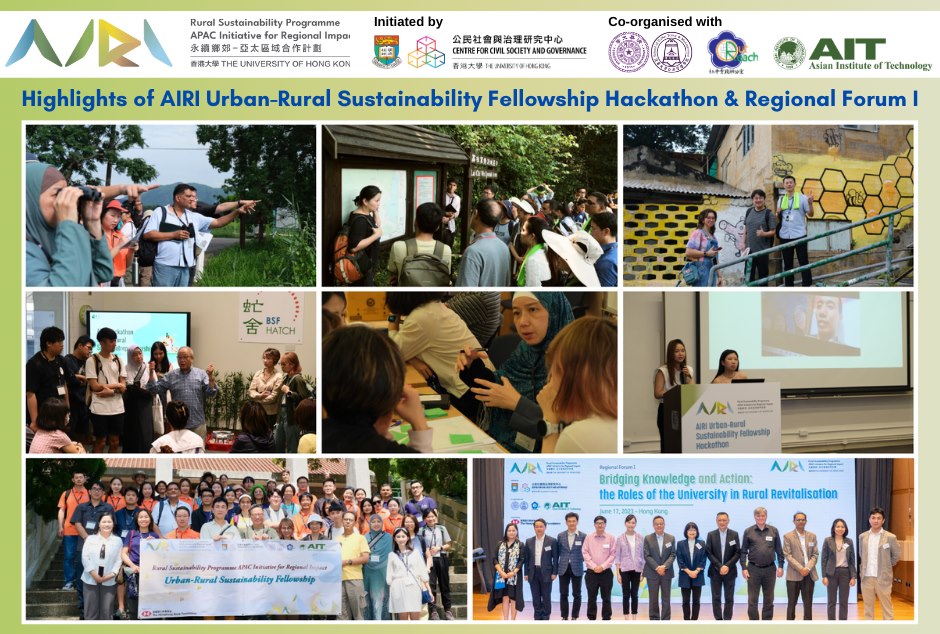
|
The Rural Sustainability Programme – APAC Initiative for Regional Impact (AIRI), by the University of Hong Kong and supported by The Hongkong Bank Foundation, successfully held its Urban-Rural Sustainability Fellowship Hackathon and Regional Forum I from 12 – 17 June 2023, in Hong Kong. Over 30 Fellows selected from the Asia-Pacific region spent a week together to create eight rural revitalisation action proposals for their regions.
|
The Hackathon, as a core part of the AIRI Urban-Rural Sustainability Fellowship, which has provided online training and local field trip opportunities since last year, was the first chance for the Fellows to meet physically after the pandemic. Among the participants were young professionals, entrepreneurs, government officers, NGO practitioners, university professors and researchers. The Hackathon offered rural experiential workshops and site visits and introduced concepts such as design thinking and urban-rural commons. Fellows then presented proposals addressing rural issues such as ageing population, unsustainable agriculture, and declining rural industries.
|
|
You can watch a short highlight video of the Forum here.
|
|
The full Forum replay video can be viewed here.
|
|
|
|
|
|
Behaviour Change: A Toolkit for Ecosystem Restoration
|
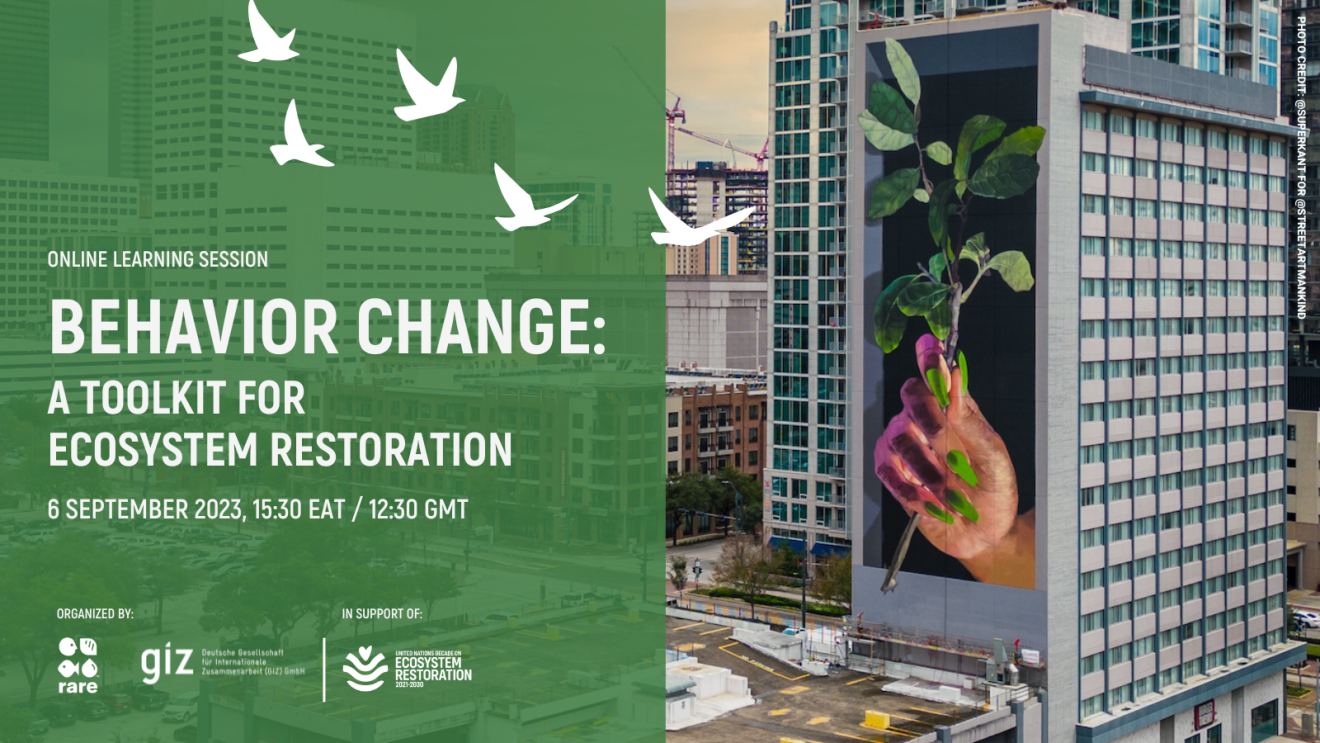
|
|
Our world is facing a triple planetary crisis. The time for ambitious action is NOW!
|
Join us for an exciting event that spotlights how our actions can supercharge efforts to restore ecosystems, co-hosted by RARE, GIZ, and the UN Decade on Ecosystem Restoration. 🚀
|
Get ready to unlock essential concepts from behavioral and social sciences, combined with design thinking principles! Offer fresh approaches to environmental challenges and dive into real-world success case studies. 🌎
|
Perfect for conservationists, policy makers, and change-drivers. Don't miss out—limited space!
|
👉 All of us can be part of #GENERATIONRESTORATION. Ready to dive in? Don't miss out this learning session!
|
|
6 September 2023 / Online
|
|
|
|
|
|
|
|
|
|
Diverse values of nature for sustainability
|
|
|
A recent article in the journal Nature, co-written by Suneetha Subramanian (Research Fellow, IPSI Secretariat), underscores the critical role of the ongoing 'values crisis' in perpetuating the global environmental emergency.
|
|
This crisis stems from the dominance of a limited set of values ill-equipped to address both biodiversity and climate challenges. The study introduces four 'values-centred approaches' to catalyse transformative change, aligning with equitable and sustainable futures. These approaches encompass recognizing diverse nature-related values, integrating them into decisions, policy reform, and shifting societal norms towards sustainability.
|
|
|
|
|
|
UN Decade on Ecosystem Restoration Action Plan Booklet
|
|
|
|
🌱🌎 What does it take to heal the planet? The UN Decade on Ecosystem Restoration's Action Plan launches 30 Challenges across 12 thematic gap areas. We call on all to join! Ready to make a difference? Learn more and pick your challenge for #GenerationRestoration
|
|
|
|
|
|
|
|
Biodiversity conservation, sustainable land use practices, agroforestry, community-based conservation, ecotourism, and the challenges faced in promoting sustainable development in the Solukhumbu region of Nepal
|
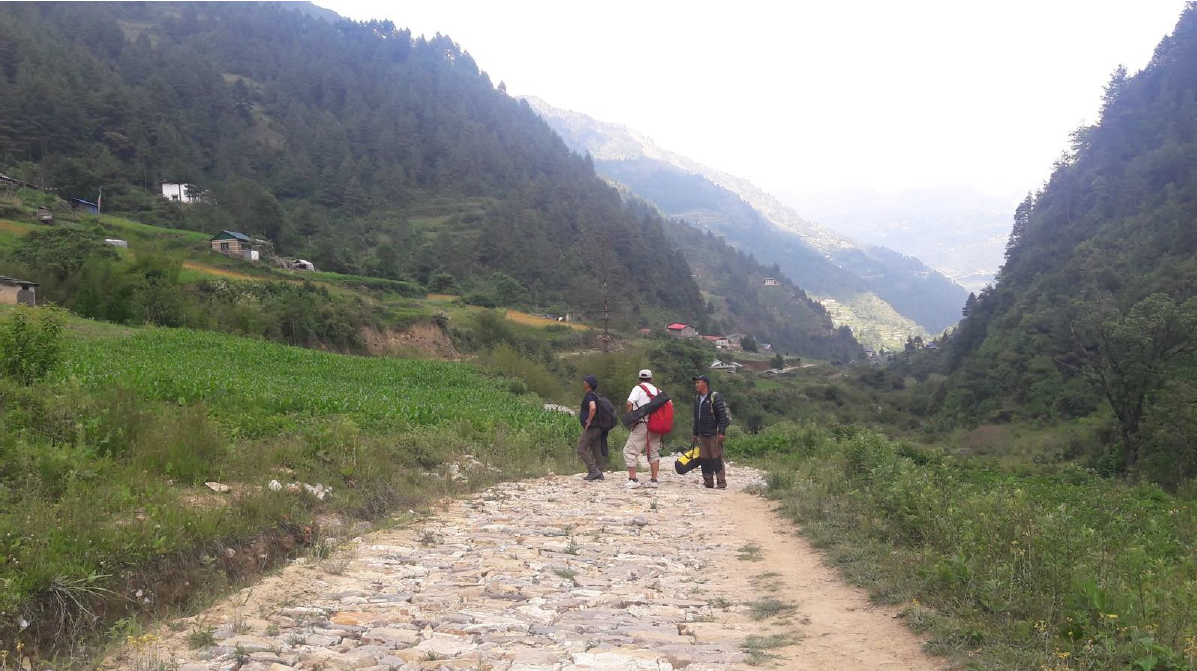
|
Annex 2: Going to attend the case study program
|
Recent case study submitted by Nepal Indigenous Nationalities Preservation Association.
|
Solukhumbu, located in the Himalayas of Nepal, has a complex but symbiotic relationship between humans and nature. The Sherpa community, known for their mountaineering skills, practices sustainable land use, including yak grazing and seasonal crop rotation. However, the increasing tourism industry has led to the degradation of the environment, including deforestation and waste management issues. The challenge is to balance economic development with sustainable resource management practices.
|
|
This study examines the socioeconomic and environmental characteristics of the Solukhumbu District in Nepal, a mountainous region known for its tourism industry and Mount Everest. Despite the opportunities, the region faces significant challenges due to its vulnerable mountain environment. Sustainable tourism is identified as a key challenge and opportunity for the region, requiring collaboration with Indigenous Peoples and local communities to address social and environmental impacts.
|
|
|
|
|
|
|
|
|

|
Let us know if there are any changes in your e-mail address or contact information.
Secretariat of the International Partnership for the Satoyama Initiative
United Nations University Institute for the Advanced Study of Sustainability (UNU-IAS)
5–53–70 Jingumae
Shibuya-ku, Tokyo 150-8925
Japan
Tel: +81 3-5467-1212
Fax: +81 3-3499-2828
Email: isi@unu.edu
If you have been forwarded this newsletter and would like to SUBSCRIBE, you can do so on the IPSI website here.
|
   
|
|
|
|
The activities of the IPSI Secretariat are made possible through the financial contribution of the Ministry of Environment, Government of Japan
|
|
|
|
|
|
|
|